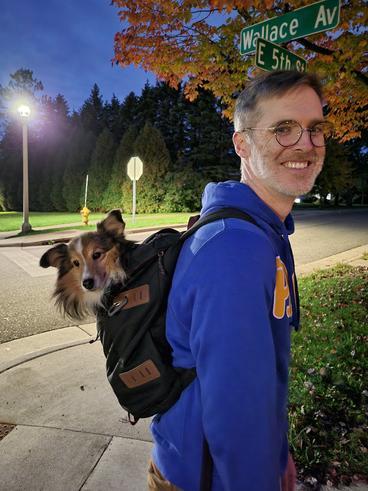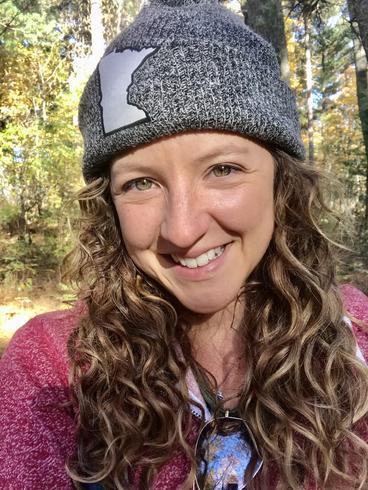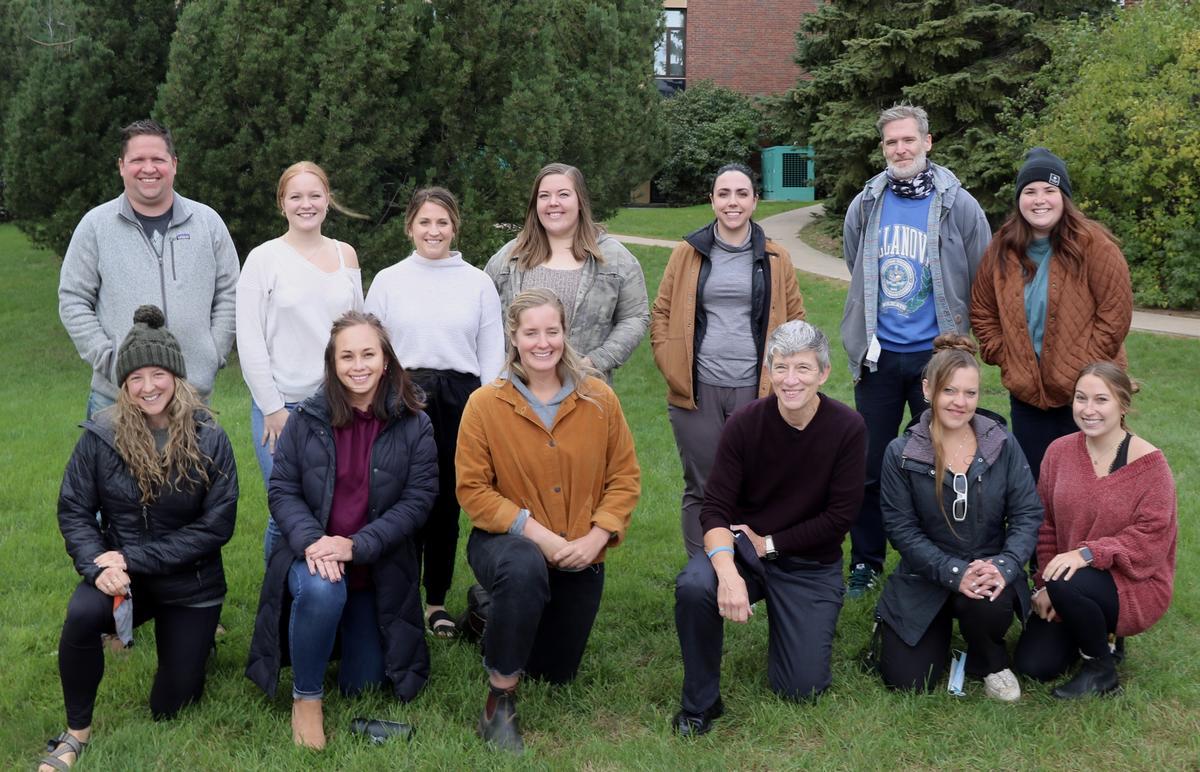The UMD Department of Social Work was awarded a $900,000 federal grant this year to provide clinical training for social work graduate students. The funding will support training stipends for up to 48 MSW students over the next four years.
This is the third and most generous round of funding the department has received from the Health Resources and Services Administration (HRSA). It’s aimed at boosting the number of clinically trained social workers in Duluth and the surrounding area, which are federally designated as health professional shortage areas.
“The reason the grant exists is to build a workforce in mental health professional shortage areas,” explains Sara Lien, who serves as MSW field director for the social work program. “What we’ve seen in these shortage areas is an exceptionally high need for mental health professionals.”
The latest grant emphasizes training practitioners to provide mental health services to children and youth and their families/primary caregivers. It’s a critical need that was recognized in a recent public health advisory by the Surgeon General. The report indicates that the “proportion of high school students reporting persistent feelings of sadness or hopelessness” increased by 40 percent from 2009 to 2019.
The MSW program is the largest graduate program on the UMD campus, with 67 active students this year. The first round of HRSA grant funding supported 24 students, the second round of funding supported 40 students. The current round will support up to 48 students—12 each year for the next four years.
Associate Professor Lake Dziengel is the Principal Investigator and project director for the Providing Advanced Clinical Training (PACT) grant. “It’s gratifying that HRSA recognized our continued excellence in training mental health social work clinicians by substantially increasing our funding this year,” Dziengel says. “The ability to also learn from and collaborate with other programs across the country through the Behavioral Health Workforce Education and Training program has added to our knowledge and expertise. The funding consistently enhanced our ability to train graduate social workers with the skills they need to provide quality mental health services.”
Training Focus
The HRSA grant funding focus on preparing master of social work (MSW) students to work with children, adolescents, and youth in transition up to age 21 is overdue. “A gap existed long before the pandemic but now there’s a really intense need for mental health and behavioral health care for kids. So it’s really good timing for providers and for kids with mental health needs,” says Wendy Anderson, associate professor of social work and director of the department’s graduate program.
The grant enables the department to award select MSW students with clinical training scholarships of $10,000 to offset tuition costs during their final internship placement. Grant funds are also available to cover licensing fees and transportation reimbursement for students who travel to rural areas for their field placements.
Anderson points out that building the capacity of rural practitioners to work with diverse populations and Indigenous communities is critical. “At the same time, the funding allows the department to attract more quality and diverse students to the program, which ultimately will benefit children, families and communities,” she adds.
PACT participants complete internships as well as classes related to mental health and clinical practice. UMD social work coursework is unique in that it prepares practitioners to work with underserved populations such as American Indians.
A children’s mental health course will also be added to the MSW curriculum, spurred by the focus of the PACT funding. The class will start this summer and will also be available to students outside the program and could benefit students in a variety of fields, such as psychology or education.
PACT students also participate in a collaborative, interdisciplinary seminar with UMD Medical School and College of Pharmacy students as well as students from health professional programs on the Twin Cities campus. They interact with and learn alongside pharmacists, nurses, occupational therapists, physician assistants, and other health care providers. The hope is that this integrated approach will give professionals a more holistic picture of the client’s needs, which should translate to better outcomes for clients.
Putting Training Into Practice
As part of the PACT program, students must complete an internship in an approved clinical setting. Students have field placements at a variety of organizations and nonprofits throughout the region, such as Northwood Children’s Services, Fond du Lac Behavioral Health Services, Hope House of Itasca County, and various school settings.

Pete Butz, PACT program participant, is interning at Genesis Recovery Services this year. The dual diagnosis treatment facility serves adults with chemical dependency and mental health issues.
Butz previously had a career focused on ecology and the environment but the pandemic made him choose to reevaluate his focus. He found himself “wanting to connect and work one-on-one with people” with the “goal of helping people improve their lives.”
Initially, Butz considered a psychology degree, but he says, “The more I learned about social work, the more it appealed to me. He applied to the UMD MSW program and didn’t look back. In his first year of the program, Butz interned at Lifehouse, working mostly with the Employment: Futures program helping homeless youth toward self-sufficiency.
At Genesis Recovery, he’s been facilitating group therapy and learning a lot. Butz says it’s been a privilege to witness the peer support between clients. “Hearing people really be vulnerable and offer their life experiences and sharing about their progress to recovery has been enlightening.”
Lindsey Lee is also part of the PACT cohort. She’s interning at Amberwing, an outpatient treatment program for children and youth with serious emotional and mental health needs.
Lee’s undergraduate focus was in justice, peace and environmental science. She started out working in outdoor education. Then she transitioned into wilderness therapy, working with youth at the Thistledew juvenile corrections facility before it closed and then at New Vision Wilderness Therapy in Medford, Wisconsin.

“I just really loved the field and learning about the different roles I could play,” she says. When Lee worked herself to the top of what she could do without a licensure she realized it was time to go back to school for a master’s degree. The UMD MSW program was the right fit for her. It doesn’t hurt that she loves Duluth.
Lee adds that she’s “super honored to be at Amberwing” working with children and youth using a dialectical behavioral therapy approach in their three-week outpatient program. She points out that the pandemic has been serendipitous because it forced providers like Amberwing to make more of a transition to offering telehealth services.
She intends to continue serving children and families in the Northland once she graduates and is particularly interested in telehealth. “I want to continue to use this new frontier to reach underserved populations and make services more equitable,” she says.
Lee is excited to be a part of the PACT cohort and is grateful for the stipend. “It was a huge relief to have financial support going into this school year. It’s allowing me to spend more time focusing on my studies and internship and less time worrying about student debt,” she says.
Paige Wright, an alumna of the MSW program, was in an earlier cohort of clinicians supported by HRSA grant funding. The stipend “absolutely” made a difference for her, allowing Wright to quit her job to focus on her internship and finishing up her degree.
Life experiences led Wright toward the social work career path. The challenges of growing up in poverty and becoming a single mom at a young age helped her to have a heightened compassion for others who are struggling—and particularly young people. She found she had a knack for working with teens and at-risk youth.
Wright earned her MSW from UMD in 2019 and now works at the Human Development Center (HDC) as a child therapist. “I have never in my life been in love with a job before and I really really love my job,” she says.
At HDC, Wright serves children from age 6 up and helps intervene early to help them cope with trauma. “Working with kids is really rewarding for me,” she says. “Especially the earliest interventions because you can help change the course or trajectory of what could potentially happen to them if they’ve gone through trauma.”
Wright marvels at the fact that kids and adults have such different ways of seeing the world. She says she’s learned a lot from the children she works with. Kids remind Wright “not to take things for granted.” After taking on this role, she also finds herself engaging with her own family more. “I remember to enjoy little things in life and be present,” she says. “It helps at work and also at home.”
